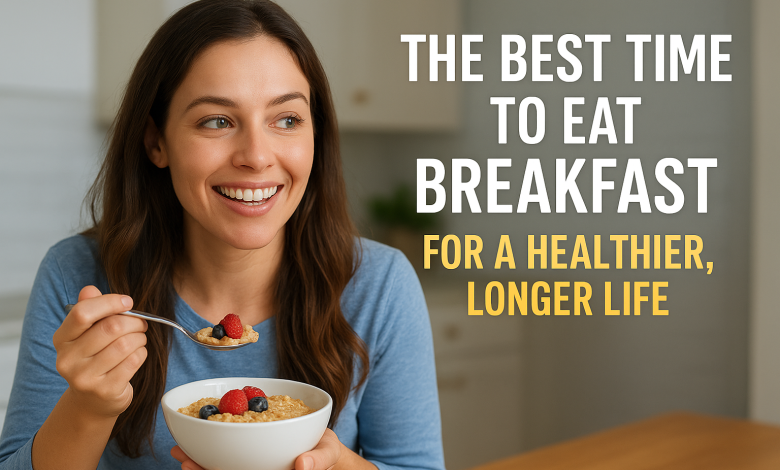The Best Time to Eat Breakfast for a Healthier, Longer Life: Science Says

They say breakfast is the most important meal of the day. But is that really true, or just an old saying passed down through generations? Modern science has a fascinating answer: the timing of your breakfast may actually influence your health, energy levels, and even how long you live.
Imagine this—one simple adjustment to when you eat breakfast could set the tone for your entire day, improving everything from your metabolism to your mood, while potentially lowering your risk for chronic diseases. That’s not just powerful—it’s life-changing.
We’ll explore the science-backed best time to eat breakfast, why timing matters, how it impacts your longevity, and practical tips to make breakfast your secret weapon for a healthier, longer life.
Why Breakfast Timing Matters More Than You Think
Most people focus on what they eat for breakfast—eggs, cereal, oats, or nothing at all. But science reveals that when you eat breakfast is just as important as what’s on your plate.
Our bodies operate on a biological rhythm known as the circadian clock. This internal clock regulates everything from sleep cycles to hormone release and digestion. Eating out of sync with your circadian rhythm can disrupt metabolism and increase risks for conditions like obesity, diabetes, and heart disease.
What Science Says About the Best Breakfast Time
Researchers have studied meal timing extensively, and the evidence is clear:
- Best Time Window: Experts recommend eating breakfast within 2 hours of waking up, ideally between 6:00 a.m. and 9:30 a.m..
- Early Morning Advantage: Eating early signals your body to “wake up” metabolically, jump-starting your energy and stabilizing blood sugar.
- Longevity Link: Studies show that those who consistently eat breakfast early have lower risks of cardiovascular disease, better insulin sensitivity, and healthier body weights—key factors in living longer.
A major study published in the Journal of the American College of Cardiology found that people who regularly skipped breakfast had a significantly higher risk of premature death from heart disease. Another study in Nature Metabolism suggested that aligning breakfast with sunlight hours improves longevity by supporting circadian rhythm balance.
The Emotional Side of Breakfast
Breakfast is more than a meal—it’s a ritual. Think about the warm comfort of coffee, the aroma of toast, or the quiet moment before the world gets noisy. Eating breakfast at the right time isn’t just good for the body—it’s good for the soul.
For many families, breakfast is also a connection time. It’s when children and parents share their first conversation of the day, when couples bond over coffee, and when individuals take a moment for self-care. That emotional nourishment is as vital as the physical one.
What Happens If You Skip or Delay Breakfast
Skipping or delaying breakfast may feel like a shortcut, especially for people trying intermittent fasting. But long-term, it can have consequences if not done strategically:
- Blood Sugar Spikes – Skipping breakfast often leads to overeating later, causing glucose surges that strain your pancreas.
- Sluggish Metabolism – Eating late disrupts circadian rhythm, slowing calorie burn.
- Increased Cravings – Delayed breakfast can lead to stronger cravings for sugary or processed foods.
- Mood Changes – Low morning energy can worsen irritability, brain fog, and anxiety.
- Increased Disease Risk – Consistent skipping is linked to higher rates of heart disease and shorter life expectancy.
What to Eat for the Perfect Longevity Breakfast
Timing matters—but so does quality. A donut at 7 a.m. won’t help you live longer. A science-backed, longevity-focused breakfast includes:
- Protein: Eggs, Greek yogurt, nuts, or lean meats to stabilize energy.
- Fiber: Whole grains, oats, chia seeds, or fruits to support digestion and gut health.
- Healthy Fats: Avocados, nut butters, or olive oil for satiety and brain function.
- Antioxidants: Berries, green tea, or leafy greens to fight inflammation.
👉 Pro Tip: A bowl of oatmeal topped with berries and chia seeds, plus a side of eggs, offers a perfect balance of protein, fiber, and antioxidants.
Cultural Wisdom About Breakfast Timing
It’s fascinating how cultures around the world have their own take on breakfast timing:
- Japan: Known for longevity, traditional Japanese breakfasts are eaten early and include fish, rice, and miso soup.
- Mediterranean Region: People eat a modest breakfast rich in olive oil, fruit, and bread—usually early in the morning.
- Western Countries: Many people delay or skip breakfast, which may partly explain the rising lifestyle-related illnesses.
The takeaway? Cultures with early, nutrient-rich breakfasts tend to have longer, healthier lifespans.
The Link Between Breakfast and Longevity
Let’s connect the dots. How does eating breakfast at the right time actually extend life?
- Protects Heart Health: An Early breakfast supports healthy blood pressure and cholesterol.
- Improves Metabolic Function: Eating in the morning helps the body use insulin more effectively.
- Supports Weight Control: Early eaters are less likely to gain weight compared to late-night eaters.
- Strengthens Mental Health: Stable blood sugar improves mood, focus, and reduces depression risk.
- Fights Inflammation: Morning antioxidants help reduce chronic inflammation linked to aging.
Practical Tips for Mastering Breakfast Timing
Here’s how you can adopt this life-enhancing habit:
- Set a Routine: Wake up and eat within two hours. Consistency matters.
- Prep Ahead: Prepare overnight oats, smoothies, or boiled eggs the night before.
- Stay Hydrated: Drink a glass of water before breakfast to kickstart digestion.
- Listen to Your Body: If you’re not hungry, start small with fruit or yogurt, then build a habit.
- Avoid Sugar Traps: Skip pastries and opt for balanced meals.
FAQs About Breakfast Timing
Q: What if I practice intermittent fasting?
A: You can still align your first meal with circadian rhythms by choosing an earlier eating window (e.g., 8 a.m.–4 p.m.).
Q: Is eating a late breakfast always bad?
A: Occasionally, no. But consistently eating late (after 11 a.m.) is linked to disrupted metabolism and reduced longevity.
Q: Does coffee count as breakfast?
A: Coffee alone doesn’t provide nutrients. Pair it with protein and fiber for real benefits.
Conclusion
The best time to eat breakfast isn’t just about avoiding hunger—it’s about aligning your body with its natural rhythm, fueling your day, and adding years to your life. Science proves that an early, balanced breakfast is one of the simplest yet most powerful habits for longevity.
So tomorrow morning, don’t just grab your coffee and rush. Sit down, nourish your body within those first golden hours, and know you’re investing in a healthier, longer future.
Because the road to longevity might just begin with what’s on your plate—and when you choose to eat it.




